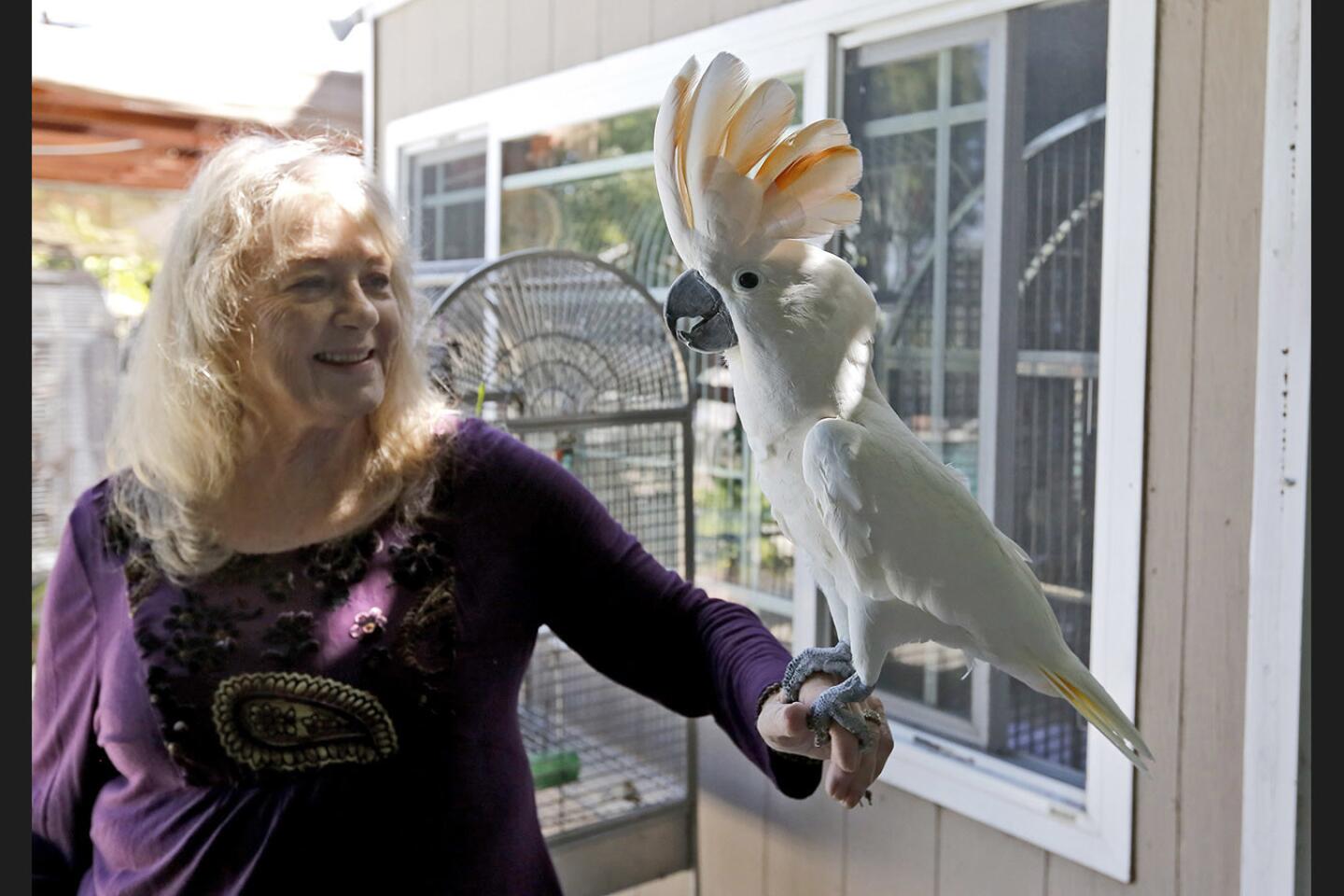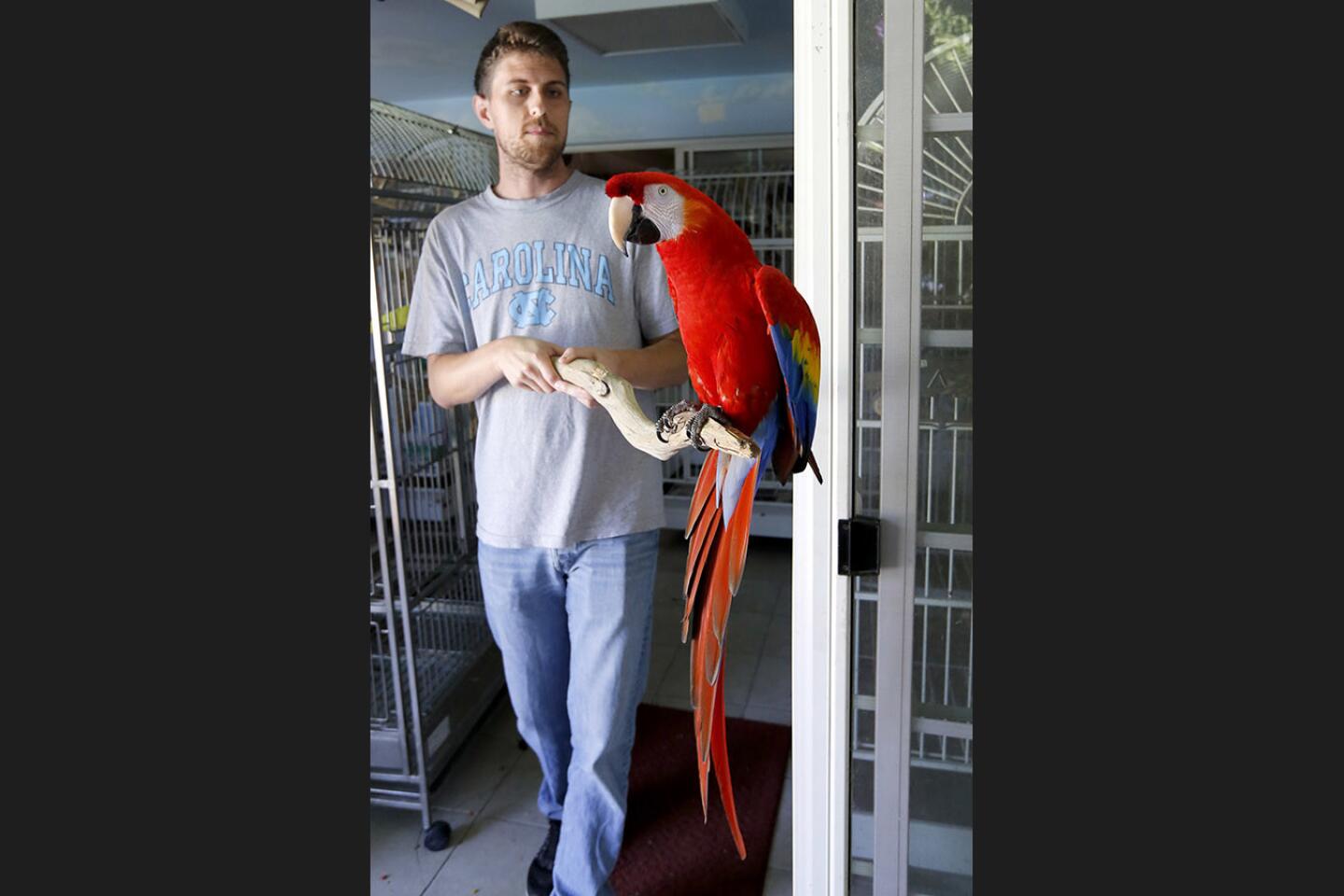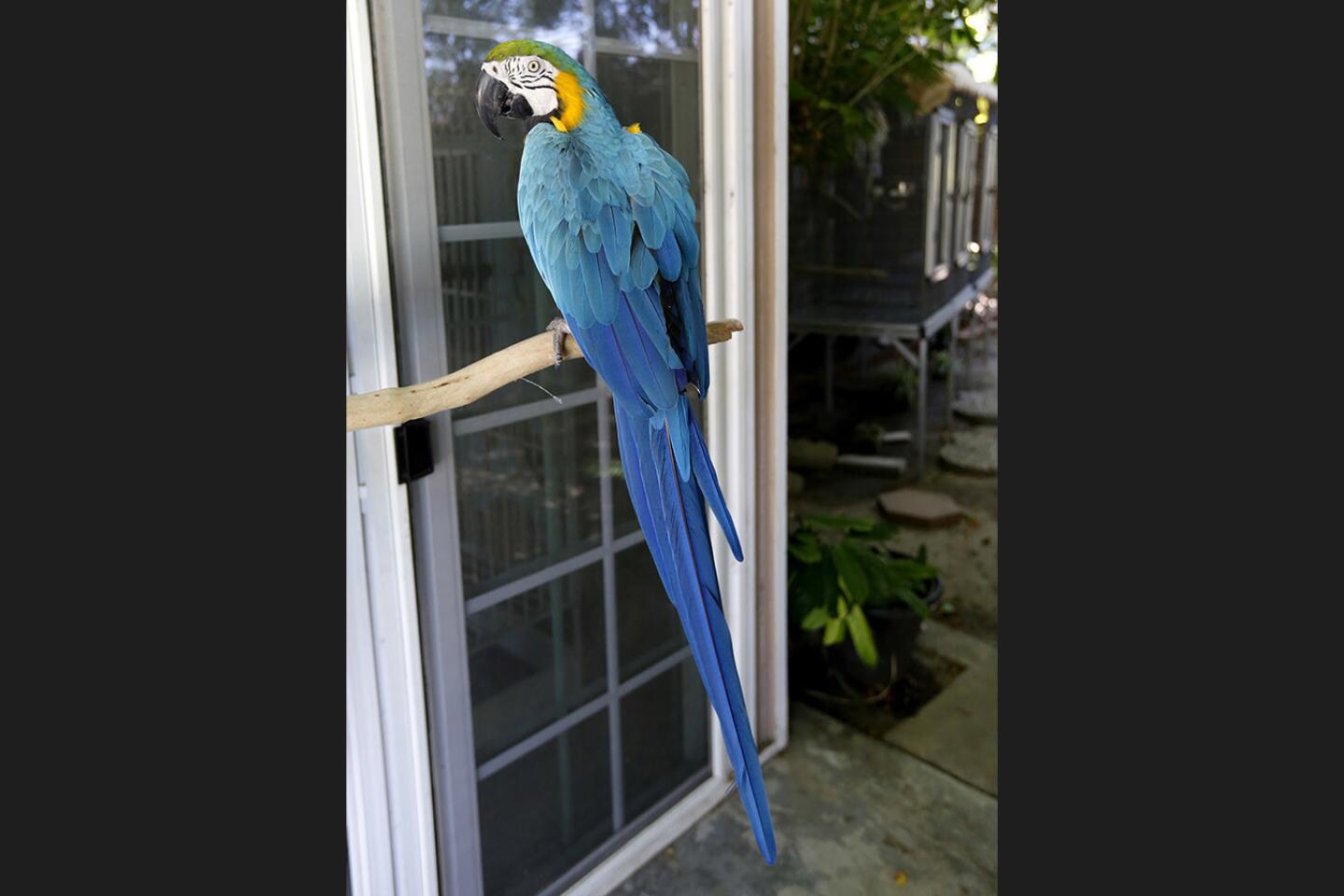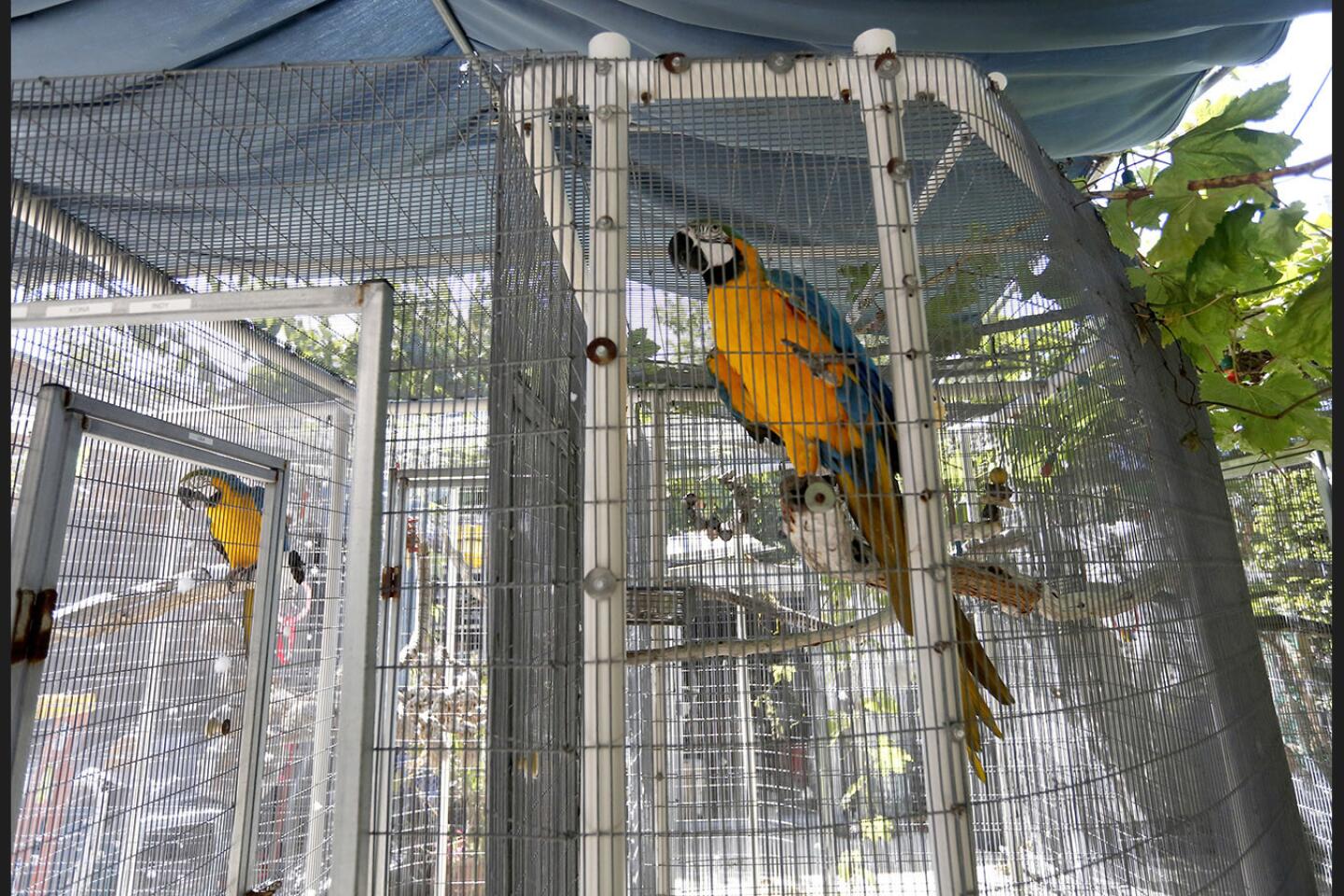Westminster parrot sanctuary is a home for life for unwanted and abandoned birds
- Share via
Cali came in missing a foot, Winston came in with a balding chest and others arrived malnourished while some entered with high anxiety.
When parrots are given up or found abandoned they go to Venette and Dan Hill’s Lily Sanctuary in Westminster, where they receive care and have a home for life. Or, better yet, a home until they are adopted by families, sanctuary volunteers said.
The sanctuary, on the first floor of the Hills’ home, has housed a number of parrots that have either endured neglect and abuse or events like the death of their owners or being shifted across different foster homes.
From the way they pluck their feathers out or project an anxious look in their eyes, it’s clear that they feel the trauma deeply, Venette Hill said.
For pet birds, the care takes plenty of dedication with days of wiping down cages and giving them consistent attention.
It’s a task that becomes too much for some owners. The number of birds being dropped off at the Hills’ doorstep has proven that.
At one point, the couple and the volunteers cared for more than 50 parrots. Currently, the sanctuary tends to 20 birds.
“We love birds so much that we want to help them, but we didn’t know how many needed homes and how many were not taken care of,” Venette Hill said. “Bird-lovers tend to get a ridiculous passion for birds and you can’t make it go away. It’s self-propelling.”
The Hills and their volunteers’ years of service to the colorful creatures began because of one parrot, the sanctuary’s namesake — Lily, an umbrella cockatoo.
Like all umbrella cockatoos, the bird was white and had long feathers at the top of her head that could flare out into a crown. But unlike a typical healthy bird, she had psittacine beak and feather disease, a viral disease that attacks feather follicles and causes beak malformation.
Lily was diagnosed with the life-threatening disease before the Hills planned to take her home from the bird store in 1989.
Instead of planning for a welcome home party, their baby bird was scheduled to be euthanized.
Venette Hill said she and her husband fell apart at the thought until a veterinarian agreed to give the cockatoo medicine for her condition. The couple took her home and continued to work with the vet.
After a couple of years, Lily no longer tested positive for the disease.
“She went on and lived 21 years,” Venette Hill said. “This is our miracle place.”
One by one, the Hills began to take in more birds who were given up due to having special needs and other circumstances.
Cali, a blue and gold macaw who was found outside with a missing foot, was brought in by an animal control volunteer.
Chelsea, a Goffin’s cockatoo, was brought to the Hills after boarding at a vet’s office. Her front body is completely bare after plucking out the feathers on her chest so hard that she practically dug into her organs.
“We never could piece together what happened to her before,” Venette Hill said.
Chelsea wears a collar to keep from plucking again.
Volunteers said many of the birds come to them after their owners have grown old and aren’t able to care for the pets.
According to the city of Westminster’s code on domestic animal permits, there is no limit on how many parrots a residential home can have.
“We’ve contacted them several times and they’ve always been very cooperative with us,” Westminster animal control officer Crystal Sheldon said of the sanctuary. “They’re allowed to have the birds as long as there’s no cruelty, neglect or disturbing of the neighbors, which this sanctuary is not.”
Westminster City Council member Sergio Contreras said he also has not heard of any complaints regarding the sanctuary.
“From what I’ve heard, it’s clean and safe,” Contreras said. “I hope they keep doing what they do. I’ve never heard of anything like it.”
The sanctuary — established as a nonprofit in 2003 — gives each bird a cage large enough to fit a tree trunk-like perch and dishes for water and food. Rope, wooden blocks and other toys dangle from the tops of the bars like mobiles over baby cribs.
“[Parrots] are quick learners and they’re very entertaining,” said sanctuary board member Brian O’Neil, who also owns a bird. “One time, I went out to start the car and it wouldn’t start, so I came back in the house and threw the keys on the counter. My bird looked at me, mimicked the sounds of the car trying to start and laughed. I said, ‘Not funny at all.’ ”
Venette Hill said having the sanctuary in a home setting with normal household activity teaches the birds how to adapt to the environment once they are adopted.
There were times the Hills did wonder about getting a separate facility for the birds outside their home.
“Whenever we thought about it, we didn’t have an answer on the other end,” Venette Hill said, noting a past instance when one of their parrots had a medical emergency in the middle of the night. “We wouldn’t like knowing that there wasn’t someone there with them all the time.”
The sanctuary has around 20 consistent volunteers who arrive to transfer the birds to the outdoor aviaries in the Hills’ backyard and to clean the cages five to six days a week.
On a Saturday last month, the macaws perched in their aviaries underneath the trees. Their long tails — some blue, some red — swayed peacefully as volunteers continued to take more birds out for fresh air and sunshine.
Across the patio, a plump bird named Tiki spread his wings wide to reveal the citron-colored feathers that hid beneath his white ones.
A white bird named Huey scurried from side to side on the long perch in his aviary. “Hiii!” he called as he moved to the left. “Byeee!” he hollered as he dashed to the right.
The sanctuary’s current needs include more volunteers along with more qualified families looking to adopt.
The process of adopting one of the sanctuary’s birds involves filling out an online application, visiting the birds multiple times to forge a connection and completing a home check.
“They each have their own personalities,” volunteer Janet Massey said of the birds. “They’re the ones that pick you. You don’t pick them.”
Even after adoption, the Hills’ bird sanctuary still acts as an educational resource to the birds’ new families or, as the sanctuary refers to them, their new “parronts.”
For more information about the sanctuary, visit thelilysanctuary.org.
Twitter: @AlexandraChan10
All the latest on Orange County from Orange County.
Get our free TimesOC newsletter.
You may occasionally receive promotional content from the Daily Pilot.











